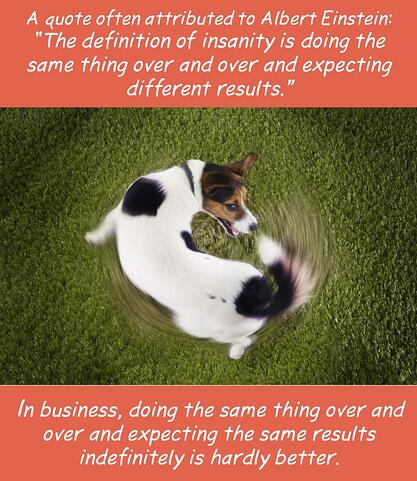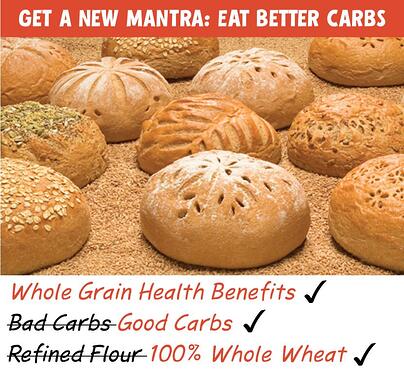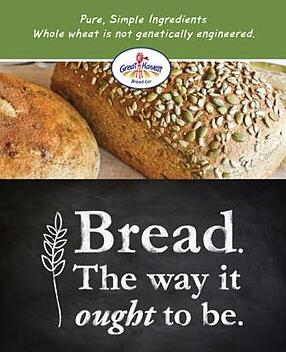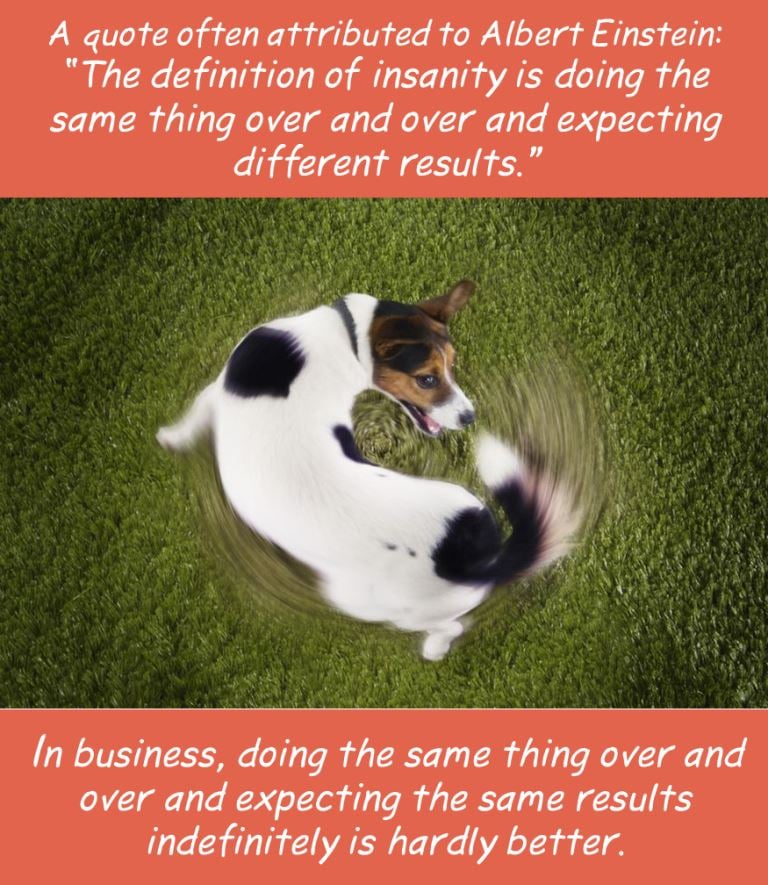Inertia: "A tendency to do nothing or to remain unchanged.” - Oxford Dictionary
 In a business sense, inertia is the tendency to just keep doing the same thing. Why? It is easy. It is comfortable. It just is. It allows you to avoid making scary changes with unknown results. But here is the most compelling reason, and the hardest one to challenge: it often works.
In a business sense, inertia is the tendency to just keep doing the same thing. Why? It is easy. It is comfortable. It just is. It allows you to avoid making scary changes with unknown results. But here is the most compelling reason, and the hardest one to challenge: it often works.
One of life’s great rules is: you don’t fix what isn’t broken. But what if something is broken and you just haven’t figured it out yet? You could be traveling one road at 60% success, and be completely happy if it’s an improvement over your prior success rate. Being hesitant to leave that road is therefore understandable. But when you consider that staying on your current path is keeping you from following another path with a 90% success rate, you can see that inertia is actually holding you back.
Change It Up
McDonald’s is a perfect example of a well-known company that has fallen victim to inertia through its single-minded focus on a standardized process (as outlined in its 750-page operation manual ─ yikes!). In the 1990’s when it was unable to quickly adapt to market changes that other food franchises were ready to respond to (such as healthier food and new menu choices), what had been its strength quickly became its weakness.1
Complacency is dangerous; in business and in life. Its source? Inertia. Why (other than that extra piece of dark chocolate I eat every day) can’t we lose those last ten pounds? Why can’t I cut a minute off of my mile time? Inertia.
The result need not be negative. Some businesses have figured out how to use inertia to their advantage. Why do Chipotle’s sales keep going up and up? How is it that Apple can do no wrong? Inertia. In Apple’s case, inertia works well for them because their model is built on innovation, so they are staying true to something that is designed for constant change.
Rethink Diet Fads the Same Way You'd Rethink Your Diet
In our business, inertia is one of our biggest obstacles to growing sales. In the 15 years I have been with Great Harvest we have seen bread challenged from many different directions. The Atkins Diet. South Beach. Low Carb. Paleo. Gluten-free. All fads that make no intuitive sense (except gluten-free, which is a different animal), yet each of these has negatively impacted bread sales. The trending habit (inertia) among consumers who buy into these diet fads is to skip the bread. Better safe than sorry. Only it’s not safe, or better.
 Well then, what is? Skip the bad bread. Go further than that, and choose the good bread; bread that is nutritionally rich. All of the trends I mention above are focused on cutting carbs, but all carbs aren’t created equally. Simple, refined carbs do all of the bad things that these fad diets complain about. Complex carbs are the opposite. They are healthy.
Well then, what is? Skip the bad bread. Go further than that, and choose the good bread; bread that is nutritionally rich. All of the trends I mention above are focused on cutting carbs, but all carbs aren’t created equally. Simple, refined carbs do all of the bad things that these fad diets complain about. Complex carbs are the opposite. They are healthy.
While there is some truth to the idea that cutting out bad carbs and refined flour is good for you, that truism doesn’t carry over to complex carbs such as whole grains. Nutritionally, that’s like comparing sliced heirloom tomatoes to ketchup packets. Or organic grapes to frozen juice concentrate. The mantra is "no carbs," "fewer carbs" or "less gluten," but what it really should be is better carbs.
Don't Let Inertia Stand Between You and Better Health
The world cares little what I want. It wants what it wants. In this case, what does the world really want? Fewer carbs. Healthier food. Longer life. Simple choices. The irony is that 100% whole wheat can do all of those things. 100% whole wheat bread reduces your mortality rate when you eat at least one 28 g serving per day. That’s one slice of nutrient-rich whole grain bread per day, which is about as simple as it gets.
Here’s an added bonus for those who are conscious about sustainability: wheat is a low impact crop in terms of environmental impact. If eating less meat is the solution to combat climate change ─ and I think there is some merit to that ─ then wheat is a great place to start as it uses relatively few resources per amount of food produced.
 Back to inertia. Our battle in the Bread Business is that people fall for the story behind the fad, or settle for something convenient yet mediocre. It doesn’t have to be that way. At Great Harvest, bread is what it should be. Our locally-owned bakeries make bread from scratch every day, by hand, the slow way. And 100% of our fresh milled whole wheat comes from family-owned farms and is tested to be chemical free. We take the best whole wheat in the world and allow it to reach its full potential, by doing as little to it as possible.
Back to inertia. Our battle in the Bread Business is that people fall for the story behind the fad, or settle for something convenient yet mediocre. It doesn’t have to be that way. At Great Harvest, bread is what it should be. Our locally-owned bakeries make bread from scratch every day, by hand, the slow way. And 100% of our fresh milled whole wheat comes from family-owned farms and is tested to be chemical free. We take the best whole wheat in the world and allow it to reach its full potential, by doing as little to it as possible.
You gain many things by beating the temptation of inertia. Question your habits of settling for store bought bread (or skipping bread altogether) and taste the difference of... Bread. The way it ought to be. Support locally-owned businesses and environmentally sustainable food practices while gaining important health benefits….like a longer life.
If you haven’t ever tried our amazing products, please do. No matter where you live, you can enjoy the nutritional benefits of our 100% whole wheat bread.
No Great Harvest bakery near you? Order our baked goods online.
If you enjoyed this post, I also recommend these posts that question the status quo:
- Scientific Truths About Modern Wheat: Why You Shouldn't Buy the Hype
- Food Business Evolution: Is There More to Life Than a Turkey Sandwich?
- Should a Bakery be a Café? Maintaining a Bread-Centric Identity
- Hyper-Localization in Franchising: "Just Do It" Just Doesn't Do It
Sources:
Sull, Donald. Why Good Companies Go Bad. Harvard Business Review. Published July, 1999. Accessed 2/25/15 here.





